From Reductionism to Creativity
< Books
| Line 53: | Line 53: | ||
**{{i|The Evolution of the God/Teacher Idea|195}} | **{{i|The Evolution of the God/Teacher Idea|195}} | ||
**{{i|The Evolution of Man as the Holomovement's Errancy Mode|199}} | **{{i|The Evolution of Man as the Holomovement's Errancy Mode|199}} | ||
| − | *{{i|12 RDZOGS-CHEN: SUPERCOMPLETENESS III| | + | *{{i|12 RDZOGS-CHEN: SUPERCOMPLETENESS III|206}} |
| − | Ontological | + | **{{i|Ontological Difference and Coordinated Hierarchy|206}} |
| − | The Ontological Difference | + | **{{i|The Ontological Difference|206}} |
| − | Coordinated Hierarchy | + | **{{i|Coordinated Hierarchy|215}} |
| − | 13 RDZOGS -CHEN: | + | *{{i|13 RDZOGS -CHEN: SUPERCOMPLETENESS IV|223}} |
| − | The Role of Fluctuations in an Individual's | + | **{{i|The Role of Fluctuations in an Individual's Psychic Evolution|223}} |
| − | Psychic Evolution | + | **{{i|The Homology of Mentation Pollutants and Originary-Awareness Modes|223}} |
| − | + | **{{i|The Dynamics of SeJf-Organization: Obscuration and Clearing|235}} | |
| − | |||
| − | |||
| − | The Homology of | ||
| − | Originary - | ||
| − | The Dynamics of SeJf- | ||
| − | Obscuration and Clearing | ||
Epilog,u 2.4 s | Epilog,u 2.4 s | ||
Notes 149 | Notes 149 | ||
Revision as of 15:22, 27 April 2020
Writing in the language of the new sciences, Herbert Guenther traces the evolution of Buddhist views on cognition and points to their relevance in the contemporary world. The history of Buddhist thought is a unique example of the interplay between reductionism and creativity, between conservatism and innovation, and it is the author's purpose to examine the interaction between these complementary movements. Of decisive importance in this context is the idea of "mind," which Buddhism recognized early on as a process rather than a thing. This recognition marked the transition from structure-oriented thinking to a vigorous process-oriented thinking, which climaxed in the holistic movement known as rDzogs-chen. Based on original texts in the Pali, Tibetan, and Sanskrit languages, the book develops the Buddhist ideas out of the context in which they originated. (Source: Shambhala Publications)
| Citation | Guenther, Herbert V. From Reductionism to Creativity: rDzogs-chen and the New Sciences of Mind. Boston: Shambhala Publications, 1989. |
|---|---|


